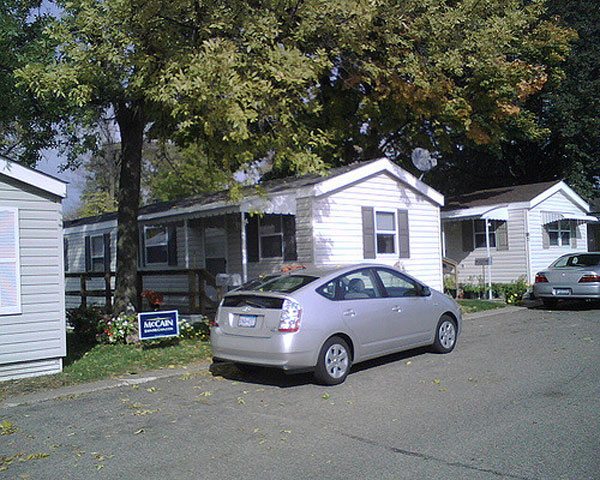
September 25, 2017; Vermont Public Radio
It’s called “the great wealth transfer”: $30 trillion in assets, 60 percent more than the nation’s annual gross domestic product, are expected to change hands as baby boomers pass on their wealth to their heirs. But where are these assets? The answer, it turns out, is that baby boomer assets permeate nearly every sector of the economy, including business ownership, home ownership, and commercial real estate ownership, such as manufactured housing (mobile home) parks, as Vermont Public Radio reports.
Manufactured housing, often sited in mobile home parks, is kind of the Rodney Dangerfield of housing—it gets no respect. And yet, as a 2015 policy brief from Prosperity Now (at the time, CFED) notes, manufactured housing is “America’s largest single source of unsubsidized affordable homeownership in the country; it is the de facto source of affordable housing in many of the nation’s most persistent poverty regions and high-cost housing markets.”
An estimated 17.5 million Americans live in manufactured housing, or about 9 million households. By contrast, only 1.1 million households in the United States are in public housing, and only about 4.5 million households receive any form of government housing subsidy at all. In other words, manufactured housing as a sector is twice as large as all federal housing assistance programs combined.
For many, however, there’s a challenge that comes with living in manufactured housing: the lack of security of tenure. You may own your own home, but a good third of the nine million households that own manufactured homes do not own the land underneath, making them, as one real estate website puts it, “vulnerable to the whims of their land-lease owners to raise lot rents, change community rules, or order eviction due to a ‘change of use’ when the land becomes more valuable.”
Decades ago, cooperative land ownership was developed as an alternative. Through a resident-owned cooperative, manufactured home owners can pool capital to gain control of and title to the land under their homes. In Vermont, according to a 2016 state report, at present there are 11 cooperatively owned mobile home parks (out of a total of 241 sites). Nationally, the ROC (Resident-Owned Communities) USA network has supported the creation of 200 cooperatively owned mobile home parks in 14 states.
One reason why the number of co-ops is modest is simple: A co-op can’t buy the land unless the owner is willing to sell. What is happening in Vermont, though, is that as mobile home park owners age, far more are starting to look for buyers, and owners are increasingly entertaining selling the mobile home parks to current residents.
In a normal year, only two or three mobile home parks in the entire state of Vermont might go on sale. But according to Jonathan Bond, director of the mobile home program at the Champlain Valley Office of Economic Opportunity, eight mobile home parks are changing hands this year, with more expected to come on the market in coming months. Howard Weiss-Tisman, reporting for Vermont Public Radio, adds that:
Bond says that as some mobile home park owners age and look to get out of the business of running a park, they are putting the land up for sale, and it is creating an opportunity for the residents to take over ownership.
Sign up for our free newsletters
Subscribe to NPQ's newsletters to have our top stories delivered directly to your inbox.
By signing up, you agree to our privacy policy and terms of use, and to receive messages from NPQ and our partners.
For park residents, when a park comes up for sale, it is their opportunity for potentially a generation to be able to purchase the park and have more control than they would ever have otherwise.
Vermont law also encourages sales of mobile home parks to residents. Under Vermont law, “when a landowner wants to sell a park, the law says residents have to be told before a sale goes through, and the residents also get about five months to organize and make an offer.”
An example of residents organizing to buy land is currently taking place at St. George Villa, a mobile home park about 20 minutes south of Burlington. With 120 mobile homes, it is one of the largest parks in the state. As Weiss-Tisman explains, residents found out about the fact that the park was going to be put up for sale “on the Friday before the July Fourth holiday weekend.” Backed by the Cooperative Development Institute, or CDI, a nonprofit that helps park residents work through the purchasing process, residents quickly organized and now hope to purchase the St. George Villa mobile home park and make it their own. Over the past six years, CDI has helped seven parks in Vermont become co-ops, and four more conversion efforts are in process.
Brenda Thibault, a resident who has lived in the mobile home park for 23 years, confesses that she had never thought about cooperative ownership before. “But she, and the rest of the residents of St. George Villa, have been learning about the process over the past few months and the group is now moving ahead with a plan to purchase the property.”
Weiss-Tisman adds that “Thibault acknowledges that there is a stigma around living in a mobile home park—while she knows the public at large may not change the way they think about the parks, she says that inside the park, owning the land and knowing it is yours will make all the difference.”
“I don’t want it to be ‘that trailer trash place,’” Thibault says, “As a co-op, when we have a say, we can kind of change that.”
The conversion is still under review, so it’s too early to know for sure if the deal will go through. Lining up financing is usually not a major obstacle, but the cost of needed upgrades sometimes can be. One positive sign is that residents seem to be determined to make it work.
“We have good people that live here, and this is their goal and this is what they want,” Thibault says.—Steve Dubb











